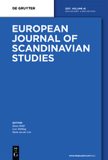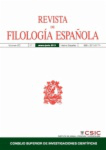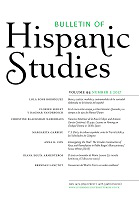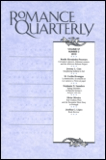
BULLETIN HISPANIQUE
metrics 2024
Unveiling the Rich Tapestry of Hispanic Discourse
Introduction
BULLETIN HISPANIQUE, published by PRESSES UNIV BORDEAUX, is a prominent academic journal dedicated to the interdisciplinary exploration of literature, linguistic studies, and historical analysis related to the Spanish-speaking world. Since its inception in 1972, the journal has established itself as a vital resource for researchers and scholars, achieving notable recognition across various categories—most recently characterized as Q2 in History, Q3 in Linguistics and Language, and Q1 in Literature and Literary Theory for the year 2023. Though it operates under traditional access models, BULLETIN HISPANIQUE maintains a commitment to scholarly excellence, offering insightful articles that contribute to the rich tapestry of cultural and linguistic discourse. With its Scopus rankings reflecting significant academic engagement, the journal serves as an essential platform for dialogue and discovery in the arts and humanities, appealing to a diverse audience of students, professionals, and academics committed to advancing knowledge in these vital fields.
Metrics 2024
 0.15
0.15 0.10
0.10 0.10
0.10 7
7Metrics History
Rank 2024
Scopus
JCI (Web Of Science)
Quartile History
Similar Journals

European Journal of Scandinavian Studies
Unveiling the nuances of culture, language, and literature.European Journal of Scandinavian Studies is an esteemed journal published by Walter de Gruyter GmbH, dedicated to advancing scholarship in the fields of Cultural Studies, Linguistics and Language, and Literature and Literary Theory. Since its inception in 2010, the journal has been a pivotal platform for researchers and scholars, showcasing cutting-edge research and critical discussions pertaining to Scandinavian languages and cultures. With an ISSN of 2191-9399 and an E-ISSN of 2191-9402, the journal emphasizes accessibility to impactful academic work, despite its current non-open access model. While the journal is categorized within the Q4 quartile for Cultural Studies and Linguistics/Language, it has shown notable potential in ranking higher in its specialized domains, fostering a growing community of researchers invested in Scandinavian studies. The journal's office is located in Berlin, Germany, further enriching its European scholarly context. As it continues to evolve, the European Journal of Scandinavian Studies serves as a vital resource for academics seeking to engage deeply with the multifaceted aspects of Scandinavian culture and linguistics.

REVISTA DE FILOLOGIA ESPANOLA
Connecting Scholars Through Open Access ResearchREVISTA DE FILOLOGIA ESPANOLA is a distinguished academic journal dedicated to the fields of linguistics and literature, published by the CONSEJO SUPERIOR INVESTIGACIONES CIENTIFICAS (CSIC) since 1954, and has been an Open Access journal since its inception. Situated in Madrid, Spain, this journal has emerged as a crucial platform for the dissemination of scholarly research, with notable rankings including Q2 in Linguistics and Language and Q1 in Literature and Literary Theory as of 2023. The journal's commitment to fostering academic dialogue is reflected in its impressive Scopus rankings, including a 79th percentile in the Arts and Humanities for Literature and Literary Theory. Covering a wide range of topics from linguistic theory to literary critique, REVISTA DE FILOLOGIA ESPANOLA is essential reading for researchers, professionals, and students alike, providing valuable insights and cutting-edge research in the ever-evolving landscape of Spanish philology.

GLOTTA-ZEITSCHRIFT FUR GRIECHISCHE UND LATEINISCHE SPRACHE
Advancing Scholarship in Greek and Latin StudiesGLOTTA-ZEITSCHRIFT FUR GRIECHISCHE UND LATEINISCHE SPRACHE, published by Vandenhoeck & Ruprecht GmbH & Co KG, stands as a pivotal academic journal within the field of Classics and Linguistics, demonstrating a strong commitment to advancing scholarly discourse surrounding the Greek and Latin languages. With a respectable Scopus ranking placing it in the top 77th percentile for Classics, this journal facilitates the dissemination of high-quality research and insights relevant to linguists, philologists, and historians alike. The journal operates without an open access model, ensuring its niche scholarship remains exclusive yet profoundly impactful. The HIndex is indicative of its longstanding influence, with the journal traces its roots back to its inception, with weighted contributions across several pivotal years. Furthermore, the journal's current standing—positioned in the Q2 quartile for Classics and Q3 quartile for Linguistics—reflects its thriving relevance and aspiration towards academic excellence, offering a significant platform for the exchange of ideas within the global scholarly community. Researchers, professionals, and students are encouraged to engage with the journal's contributions, as it consistently reflects the evolving dialogue in the study of ancient languages.

BULLETIN OF HISPANIC STUDIES
Fostering Dialogue Across Hispanic Cultures and TextsBULLETIN OF HISPANIC STUDIES, published by Liverpool University Press, is a distinguished peer-reviewed journal dedicated to the exploration of Hispanic cultures, literatures, and linguistic studies. With an ISSN of 1475-3839 and an E-ISSN of 1478-3398, this journal is a vital platform for researchers, scholars, and students alike, offering critical insights and innovative research from a broad spectrum of perspectives within its fields. Notably, as of 2023, it holds a commendable position in Q2 of Linguistics and Language and Q1 in Literature and Literary Theory, demonstrating its significant impact in these disciplines. The journal spans a period from 2002 to 2024, providing a rich historical arc of scholarship in Hispanic studies. It operates in the United Kingdom and remains accessible through subscription-only models, ensuring a quality curation of content. With a native address at 4 Cambridge St, Liverpool L69 7ZU, England, the BULLETIN OF HISPANIC STUDIES remains committed to advancing knowledge and fostering dialogue in the ever-evolving landscape of linguistic and literary inquiry.

Skandinavskaya Filologiya
Fostering Interdisciplinary Insights in Scandinavian Studies.Skandinavskaya Filologiya is a distinguished academic journal published by St Petersburg University Press that specializes in Scandinavian philology and linguistics. With its ISSN 0202-2397 and E-ISSN 2618-9518, this journal serves as a vital platform for scholarly articles that explore the intricate languages, literature, and cultural nuances of the Scandinavian region. The journal seeks to promote interdisciplinary research and foster collaboration among linguists, literary scholars, and cultural researchers interested in the rich heritage and contemporary developments within Scandinavian studies. Although the journal operates without open access, it is committed to enhancing academic discourse and providing a valuable resource for students, professionals, and researchers. Located in the vibrant city of St Petersburg, Russia, the journal aims to bridge the gap between Eastern and Western scholarship in Scandinavian philology, making it a significant contributor to the field.

Philologica Canariensia
Connecting scholars through open access to cutting-edge research.Philologica Canariensia is a distinguished academic journal published by the University of Las Palmas de Gran Canaria, focusing on the vibrant fields of Literature and Literary Theory as well as Linguistics and Language. With an impact factor that positions it in the Q1 and Q2 quartiles in its respective categories as of 2023, the journal has established itself as an important platform for scholarly communication and research. Since transitioning to Open Access in 2014, it has broadened its reach, allowing researchers, professionals, and students from around the globe to access high-quality publications without barriers. With a commendable presence in Scopus rankings, including a rank of #309 out of 1106 in Literature and Literary Theory, Philologica Canariensia aims to foster an interdisciplinary dialogue and advance knowledge in the humanities. The journal's commitment to publishing innovative research makes it an essential resource for anyone engaged in exploring linguistic and literary phenomena.

ROMANCE QUARTERLY
Navigating the Landscape of Literary RomanceROMANCE QUARTERLY is an esteemed journal published by Routledge Journals, Taylor & Francis Ltd, focusing on critical discussions and innovative research in the fields of Cultural Studies and Literature and Literary Theory. With its inception in 1986, this journal has diligently documented the evolving landscape of romance literature, making significant contributions through interdisciplinary approaches that resonate across literature and cultural scholarship. Holding a commendable position in academic rankings, it is classified in the second quartile for Literature and Literary Theory, and in the third quartile for Cultural Studies as of 2023, highlighting its relevance and impact within these domains. While it operates under a traditional access model, the required scholarly discourse and access to contemporary studies make it a crucial resource for researchers, educators, and students alike. ROMANCE QUARTERLY serves not merely as a platform for publishing but as a vibrant hub for the exploration and analysis of romance narratives, offering invaluable insights into their impact on cultural and societal constructs, surely a must-read for anyone passionate about these subjects.

Listy Filologicke
Cultivating a Nexus for Innovative Academic Exploration.Listy Filologicke is a distinguished academic journal published by the Institute of Classical Studies at the Academy of Sciences of the Czech Republic, focusing on the interdisciplinary fields of History, Linguistics and Language, and Literature and Literary Theory. With an ISSN of 0024-4457 and an E-ISSN of 2570-9410, this journal has been a pivotal platform for scholarly discourse since its convergence years began in 2003. Notably, it holds a Q3 classification in History and Linguistics and Language, and a Q2 in Literature and Literary Theory as of 2023. Its rankings within Scopus illustrate its relevance and impact in academia, with noteworthy positions in the Arts and Humanities and Social Sciences categories. Researchers, professionals, and students will find Listy Filologicke an invaluable resource for exploring cutting-edge research, critical analyses, and discourse that contribute significantly to their respective fields. Based in the heart of the Czech Republic, it continues to promote scholarly excellence and foster international collaboration.

Vestnik Sankt-Peterburgskogo Universiteta-Yazyk i Literatura
Fostering Critical Insights in Linguistics and LiteratureVestnik Sankt-Peterburgskogo Universiteta-Yazyk i Literatura, published by ST PETERSBURG UNIV PRESS, stands as a pivotal academic journal in the fields of linguistics and literature, reflecting a profound commitment to the exploration of language and literary theory. With an ISSN of 2541-9358, this journal has steadily built its reputation since its inception in 2017, achieving impressive rankings in Scopus that place it within the top tiers of its categories—Q2 in Linguistics and Language and Q1 in Literature and Literary Theory as of 2023. The journal serves as an essential platform for researchers, professionals, and students who are keen to delve into the complex interactions between language and literature. Although currently not offering Open Access, its contributions are invaluable to advancing scholarly dialogue and fostering understanding within these vibrant fields. With a converged publication timeline extending through 2024, Vestnik Sankt-Peterburgskogo Universiteta-Yazyk i Literatura exemplifies the ongoing commitment to high-quality research and critical thought, making it an indispensable resource for those dedicated to the study of language and its literary manifestations.

STUDI E PROBLEMI DI CRITICA TESTUALE
Advancing Literary Theory Through Rigorous AnalysisSTUDI E PROBLEMI DI CRITICA TESTUALE is a distinguished journal published by FABRIZIO SERRA EDITORE, focusing on the critical analysis of texts, literary theory, and related areas. Based in Italy, this journal circulates within the vibrant landscape of literary studies, fostering scholarly dialogue and promoting rigorous research methodologies. It has been recognized within the Q4 category in Literature and Literary Theory, reflecting its niche yet impactful presence in academia, as showcased by its Scopus rank of #1046 out of 1106, placing it in the 5th percentile for its field. Although it does not currently offer Open Access options, the journal has undergone various phases of publication from 2002 to 2018 and has made a notable return from 2020 to 2023. STUDI E PROBLEMI DI CRITICA TESTUALE serves as an essential platform for researchers, professionals, and students to explore and disseminate critical insights in literary studies, ultimately contributing to the advancement of knowledge in this dynamic field.